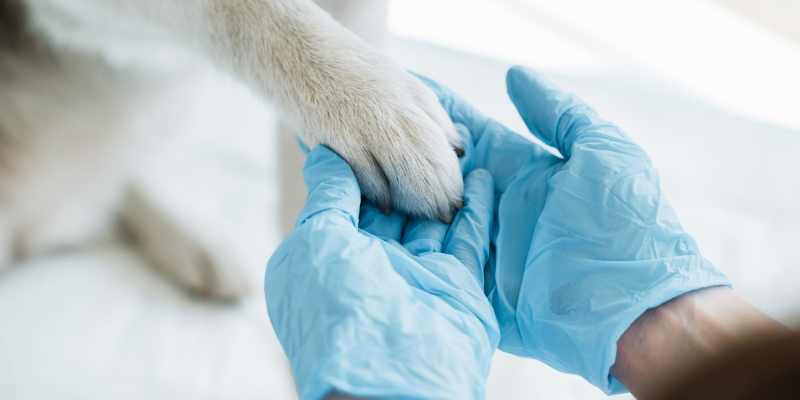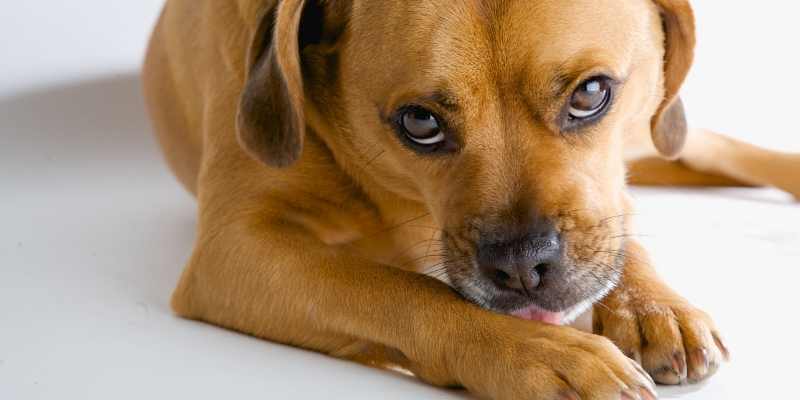While it’s common for dogs to refresh their paws from time to time an excessive licking is usually indicating that there’s a problem.
Pups who lick their paws too much can create stains on their feet (if they are light-colored). And may even develop swollen wounds that can be tricky to cure.
Do you have a specific question about the reasons why puppy can lick his paws? Then use the table of contents below to jump to the most relevant section. And you can always go back by clicking on the black arrow in the right bottom corner of the page. Also, please note that some of the links in this article may be affiliate links. For more details, check the Disclosure section at the bottom of the page.
Here's what we'll cover:

The most typical 5 reasons why puppy licking paws
#1 Something hurts
Not necessarily something visible, like the burr in pup’s toes. It may be an inflammation or skin infection. Or even joint pain. More thorough examination performed by the vet is needed in this case too identify the exact cause.
#2 Fleas or Ticks
Fleas and ticks cause severe itchiness that can lead to compulsive paw licking and chewing. The condition can get even worse if your dog is allergic to fleas. In addition to using insecticides and flea medication, make sure to rid your house of fleas.
If your pet is allergic to cleaning products or over-the-counter medications, there are non-toxic ways to get rid of fleas and prevent them from coming back. (By the way, if your pup is a frequent allergy sufferer you might check my most on about Claritin dosage and use for dogs).
#3 Dry Skin
Hairless breeds are often predisposed to various skin conditions, including dryness. Because they don’t have that natural fur skin protection.
Dry skin is also prevalent among dogs residing in cold climates. If this is the case, ask your doctor to suggest a dog oil to relieve the dryness. If you are concerned that oils will add a greasy touch to your interiors, you can pick up some supplements or vitamins for dry skin instead.
Another suggestion, if the dry skin if your pup’s case, you have to avoid the use of harsh soaps and unnecessary bathing.
#4 Yeast infection or allergies
Constant licking is typically attributed to allergies. It could be the chemicals in your yard, pup’s food, the cleaning products you use around the house and pretty much anything else.
For instance, if a puppy is licking the paws after walking, then the itching might be provoked by pesticides in the grass he stepped on. If that’s the case, wash your pup’s paws to prevent additional irritation.
A potential solution to a problem might be trying to clean the pup’s paw after being outside. There are very specific products that are not toxic for your pet but eliminate all the possible bacterias and allergens. You can try cleaning fizz balls, for instance.
If that didn’t work, make sure to schedule an appointment with the vet and have him or her perform allergy tests to figure out the cause.

#5 Obsessive-compulsive disorder
It is not rare for puppies to develop extreme licking (even to the point of creating an actual wound to their skin, for instance, lick granuloma lesions). This can happen for many psychological reasons: separation anxiety, boredom, stress, etc.

What to do if you’ve noticed your pup licking his paws?
Begin by a thorough inspection of the paws. Look for external objects, bruises, cuts, crusting, swelling, and anything else that seems abnormal. Give first aid if needed. Note that extreme licking may induce rust-colored saliva stains on the fur around the paws. It’s more visible if your pup has a lighter coat.
It’s essential to contact your vet whether or not the paws look strange to you. He or she will then likely do a complete check-up to rule out the reasons for excessive licking. A comprehensive physical examination and testing can help to identify the trigger, causing the problem.

How do you stop the dog licking?
In case a specific disorder is found, a particular treatment will be prescribed to resolve the paw licking issue. Just follow the vet’s guidelines, and your pup will be going to be okay in no time.
Thanks for the blog graphics: Canva.com


